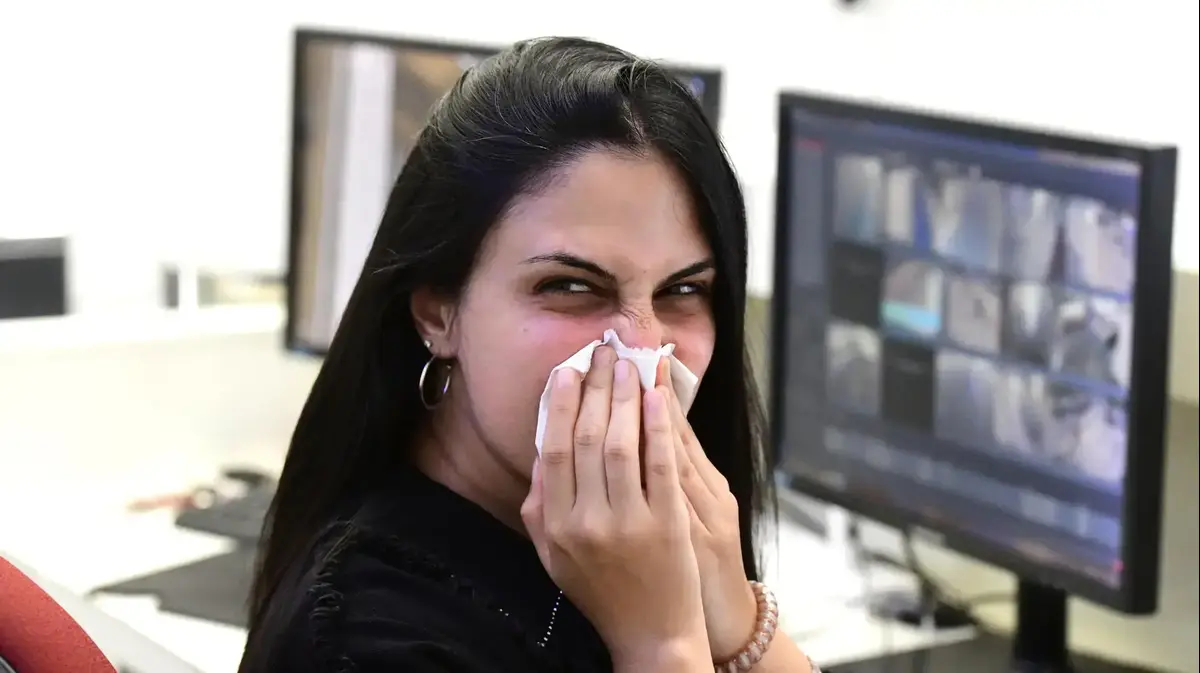Did you catch a cold?
It may make you more immune to Corona
Some colds are caused by viruses from the corona family, the efficient way our body fights them, leaving in our body memory cells that provide protection that can be much more durable than that of the vaccine
Walla!
health
11/01/2022
Tuesday, 11 January, 2022, 11:20 Updated: 11:37
Share on Facebook
Share on WhatsApp
Share on Twitter
Share on Email
Share on general
Comments
Comments
In the video: The Ministry of Health recommends performing antigen tests 3 days after exposure (Photo: Ministry of Health)
Have you had a cold this winter?
Many of you are likely to respond in the affirmative.
For you, we have good news.
The natural defenses that arise in the body in response to a common cold may provide some protection against corona as well.
This emerges from a new study, published in the prestigious journal Nature Communications.
This is a relatively small study, which included 52 medical cases, of people living in the same home with a person infected with covid-19.
Those of them who developed a kind of "memory bank" of specific immune cells following a cold - were found to have a lower risk of contracting corona, even when living in the same house with a verified patient.
The researchers wanted to make it clear in advance that this is not a reliable defense, and that vaccines are still the key to success in the fight against the spread of the virus.
However, they believe that their findings can provide important insights into how the body's defense system fights the corona virus.
More on Walla!
There is a new corona vaccine: this is the country that will get it first
To the full article
Quite a few of the colds are caused by viruses from the corona family.
Woman blows her nose (Photo: ShutterStock)
Covid-19 disease is caused by a virus from the corona family.
Other viruses from the same family cause colds.
The researchers therefore wondered and sought to test whether developing immunity against one type of virus from the family might help protect against another virus.
However, keep in mind that not all colds are necessarily caused by a virus from the corona family, there are also viruses from other families that can cause the same symptoms, so even if you have a cold this season, do not conclude that you are protected from corona.
The cells that are not forgotten
The study was conducted at Imperial College London, and what motivated the researchers was the question: Why do some people get infected with corona following exposure while others do not? They focused their work on a key player in the human immune system: T cells.
Some T cells destroy any cell that is affected by a particular pathogen - for example, the common cold virus. And after the cold has passed, some of the T cells remain in the body as a kind of "memory bank", ready to go into rapid action the next time they encounter the same virus they have already learned to recognize.
The study included 52 people who in September 2020 were not yet vaccinated against corona, and lived in the same home along with people who were found to be verified for corona.
Half of the participants became infected in Corona during the 28 days of follow-up during which the study period lasted, and half did not become infected.
Among the non-infected group, high levels of specific T cells in the blood were found in a third of the people.
The researchers estimate with high probability that these memory cells were formed in the bodies of the study participants as a result of infection with another virus from the corona family - and most likely it is a cold virus.
In a third of those who were not infected, high levels of specific T cells were found in the blood.
Woman with disinfecting mask (Photo: ShutterStock)
More on Walla!
New guidelines: This is how you will perform an antigen test for a reliable result
The corona may increase the risk of this disease in children.
How dangerous is it?
B-Cure Laser - Does It Help With Knee Pain?
Wider and longer protection against corona
At the same time, the researchers recognized that there were other variables that could affect their chances of infection - such as the quality of ventilation in the home where they lived with the verified patient and the nature of the contact they had with him and how close he was.
"Studying the body's natural responses that have been beneficial against virus infection can help develop new and more effective vaccines," said Prof. Agit Levani, who led this study at Imperial College. Current vaccines focus on the spike protein, which is located on the outside of the corona virus, but this protein may change as the virus mutates and new versions are formed - as we have learned well in our flesh using variants like the omicron commonly used today.
In contrast, the T cells of the immune system attack proteins that are inside the virus, and these tend to be much more stable and do not change frequently from variant to variant.
This means that a vaccine that manages to harness the behavior of T cells may be able to provide broader and longer-lasting protection against the corona virus, the researcher explained.
health
news
Tags
cold
Cooling
Corona
covid-19
Corona virus
immune system
Vaccine for corona













